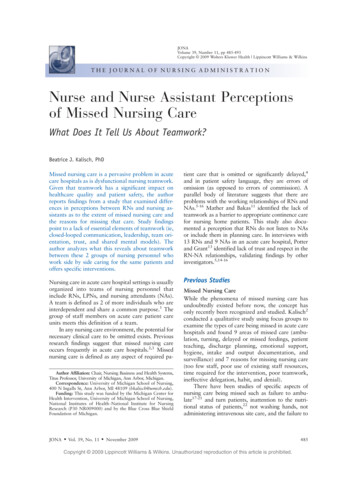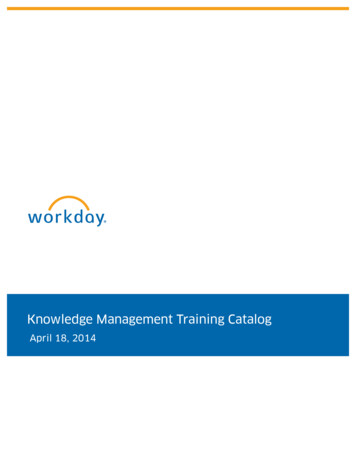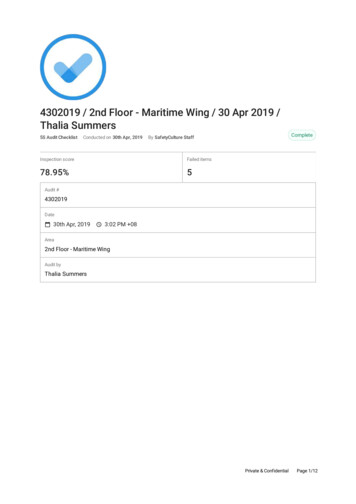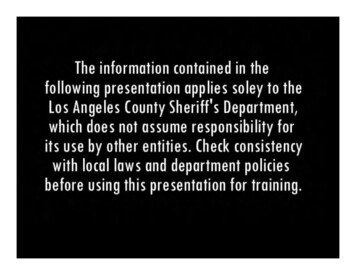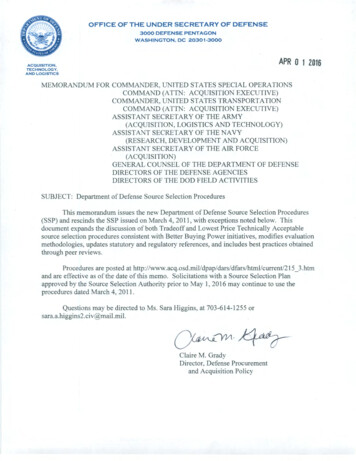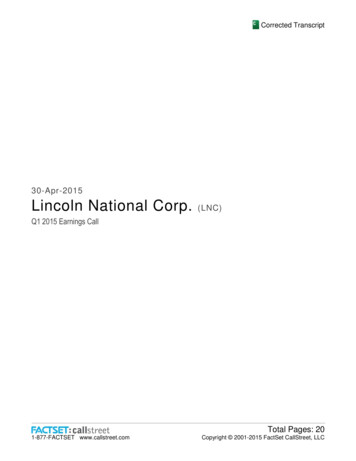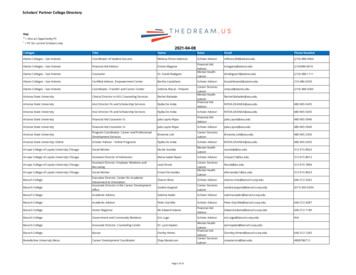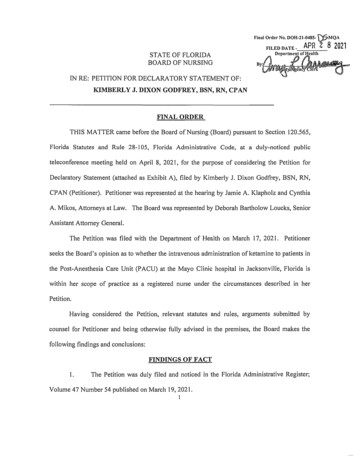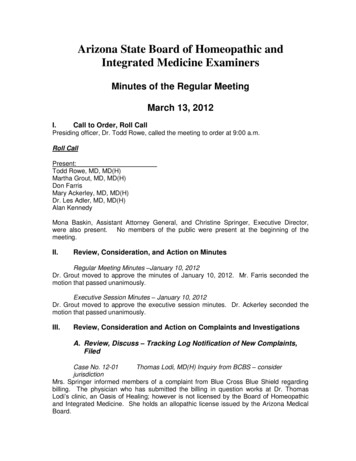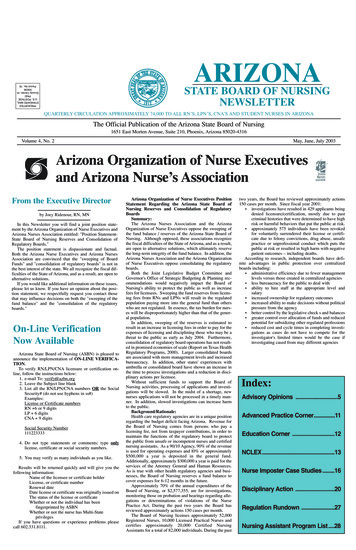
Transcription
ARIZONAPRESORTEDSTANDARD MAILU.S. POSTAGEPAIDGrundy Center, IA50638Permit No. 18STATE BOARD OF NURSINGNEWSLETTERQUARTERLY CIRCULATION APPROXIMATELY 74,000 TO ALL RN’S, LPN’S, CNA’S AND STUDENT NURSES IN ARIZONAThe Official Publication of the Arizona State Board of Nursing1651 East Morten Avenue, Suite 210, Phoenix, Arizona 85020-4316Volume 4, No. 2May, June, July 2003Arizona Organization of Nurse Executivesand Arizona Nurse’s AssociationFrom the Executive Directorby Joey Ridenour, RN, MNIn this Newsletter you will find a joint position statement by the Arizona Organization of Nurse Executives andArizona Nurses Association entitled: "Position StatementState Board of Nursing Reserves and Consolidation ofRegulatory Boards."The position statement is dispassionate and factual.Both the Arizona Nurse Executives and Arizona NursesAssociation are convinced that the "sweeping of BoardFunds" and "consolidation of regulatory boards" is not inthe best interest of the state. We all recognize the fiscal difficulties of the State of Arizona, and as a result, are open toalternative solutions.If you would like additional information on these issues,please let us know. If you have an opinion about the position statement, we respectfully request you contact thosethat may influence decisions on both the "sweeping of thefund balance" and the "consolidation of the regulatoryboards."On-Line VerificationNow AvailableArizona State Board of Nursing (ASBN) is pleased toannounce the implementation of ON-LINE VERIFICATION.To verify RN/LPN/CNA licensure or certification online, follow the instructions below:1. e-mail To: verify@azbn.org2. Leave the Subject line blank3. List all the RN/LPN/CNA numbers OR the SocialSecurity# (do not use hyphens in ss#)Examples:License or Certificate numbersRN 6 or 9 digitsLP 6 digitsCNA 9 digitsSocial Security Number1112233334. Do not type statements or comments; type onlylicense, certificate or social security numbers.5. You may verify as many individuals as you like.Results will be returned quickly and will give you thefollowing information:Name of the licensee or certificate holderLicense, or certificate numberRenewal dateDate license or certificate was originally issued onThe status of the license or certificateWhether or not the individual has beenfingerprinted by ASBNWhether or not the nurse has Multi-StateprivilegesIf you have questions or experience problems pleasecall 602.331.8111.Arizona Organization of Nurse Executives PositionStatement Regarding the Arizona State Board ofNursing Reserves and Consolidation of RegulatoryBoardsSummary:The Arizona Nurses Association and the ArizonaOrganization of Nurse Executives oppose the sweeping ofthe fund balance / reserves of the Arizona State Board ofNursing. Although opposed, these associations recognizethe fiscal difficulties of the State of Arizona, and as a result,are open to alternative solutions, which ultimately reservethe long-term integrity of the fund balance. In addition, theArizona Nurses Association and the Arizona Organizationof Nurse Executives oppose consolidating the regulatoryboards.Both the Joint Legislative Budget Committee andGovernor's Office of Strategic Budgeting & Planning recommendations would negatively impact the Board ofNursing's ability to protect the public as well as increasefees for licensees. Sweeping the fund reserves from licensing fees from RNs and LPNs will result in the regulatedpopulation paying more into the general fund than otherswho are not regulated. In essence, the tax burden for nurses will be disproportionately higher than that of the general population.In addition, sweeping of the reserves is estimated toresult in an increase in licensing fees in order to pay for theexpenses of licensing and disciplining those who may be athreat to the public as early as July 2004. Furthermore,consolidation of regulatory board operations has not resulted in promised economies of scale (Report on Texas HealthRegulatory Programs, 2000). Larger consolidated boardsare associated with more management levels and increasedbureaucracy. In addition, other states' experiences withumbrella or consolidated board have shown an increase inthe time to process investigations and a reduction in disciplinary actions per licensee.Without sufficient funds to support the Board ofNursing activities, processing of applications and investigations will be slowed. In the midst of a shortage, newnurses applications will not be processed in a timely manner. In addition, slowed investigations can increase harmto the public.Background/Rationale:Health care regulatory agencies are in a unique positionregarding the budget deficit facing Arizona. Revenue forthe Board of Nursing comes from persons who pay alicensing fee, not from taxpayer contributions, in order tomaintain the functions of the regulatory board to protectthe public from unsafe or incompetent nurses and certifiednursing assistants. As a 90/10 Agency, 90% of the revenueis used for operating expenses and l0% or approximately 500,000 a year is deposited in the general fund.Additionally, approximately 300,000 a year is paid for theservices of the Attorney General and Human Resources.As is true with other health regulatory agencies and businesses, the Board of Nursing reserves a fund balance tocover expenses for 6-12 months in the future.Approximately 70% of the annual expenditures of theBoard of Nursing, or 2,577,355, are for investigations,monitoring those on probation and hearings regarding allegations or determinations of violations of the NursePractice Act. During the past two years the Board hasreviewed approximately actions 150 cases per month.The Board of Nursing licenses approximately 52,000Registered Nurses, 10,000 Licensed Practical Nurses andcertifies approximately 20,000 Certified NursingAssistants for a total of 82,000 individuals. During the pasttwo years, the Board has reviewed approximately actions150 cases per month. Since fiscal year 2001: investigations have resulted in 429 applicants beingdenied licensure/certification, mostly due to pastcriminal histories that were determined to have highrisk or harmful behaviors that put the public at risk. approximately 575 individuals have been revokedfor voluntarily surrendered their license or certificate due to felony convictions, drug abuse, unsafepractice or unprofessional conduct which puts thepublic at risk or resulted in high harm with negativepatient outcomes – including deaths.According to research, independent boards have definite advantages in public protection over centralizedboards including: administrative efficiency due to fewer managementlevels versus those created in centralized agencies less bureaucracy for the public to deal with ability to hire staff at the appropriate level andsalary increased ownership for regulatory outcomes increased ability to make decisions without politicalpressure from the agency better control by the legislative check s and balances greater control over allocation of funds and reducedpotential for subsidizing other regulated professions reduced cost and cycle times in completing investigations as cases do not have to compete for theinvestigator's limited times would be the case ifinvestigating cased from may different agenciesIndex:Advisory Opinions .5Advanced Practice Corner.11Education Corner .12NCLEX.13Nurse Imposter Case Studies .16Disciplinary Action .20Regulation Rundown .27Nursing Assistant Program List.28
PAGE 2 ARIZONA STATE BOARD OF NURSING NEWSLETTERGOVERNORThe Honorable Janet NapolitanoBOARD MEMBERSKathy Malloch, PhD, MBA, RNPresidentRuth Eskesen, PhD, RNVice PresidentBarbara O’Connor, LPNSecretaryTrista Campbell, RN, BSNMemberMarla Embry, RN, BSN, MAMemberAlice Gagnaire, RN, MSHAMemberGregory Y. Harris, Public MemberPublic MemberLisa Hyatt, LPNMemberBeverly Ogden, Public MemberPublic MemberMAY, JUNE, JULY 2003BOARD OF NURSING CONTACT NUMBERSMAIN LINE:FAX:e-MAIL:HOME PAGE:(602) 331-8111(602) g.orgADMINISTRATIONJoey Ridenour RN, MNJudy Bontrager RN, MNValerie Smith RN, MSLila WiemannLouise MoranExecutive DirectorAssociate Director - OperationsAssociate Director/Nursing PracticeAdministrative Assistant to the Executive DirectorLegal Secretary to the Associate Directors602-331-8111 x125602-331-8111 x143602-331-8111 x145602-331-8111 x168602-331-8111 bn.orglwiemann@azbn.orglmoran@azbn.orgCHEMICAL DEPENDENCE / CANDOPatricia Reeder RN, MS, Ed.S.Nurse Consultant-CANDODolores HurtadoLegal Secretary - Monitoring & CANDOOlga ZunigaAdministrative Secretary - Monitoring & CANDO602-331-8111 x138602-331-8111 x123602-331-8111 orgEDUCATIONPamela Randolph RN, MS, CPNPMeredith FountainConsultant, Educational Programs RN/LPN/CNAAdministrative Assistant-Education602-331-8111 x139602-331-8111 x133prandolph@azbn.orgmfountain@azbn.orgFISCAL SERVICESDiane SerraNorma SalterBusiness ManagerAccounting Technician602-331-8111 x192602-331-8111 x130dserra@azbn.orgnsalter@azbn.orgHEARINGSusan Barber RN, MSNVicky DriverNurse Practice Consultant-Hearing DepartmentAdm. Asst./Hearing Department602-331-8111 x126602-331-8111 x132sbarber@azbn.orgvdriver@azbn.orgCNACNAAdvanced Practice/RN/LPNRN/LPNRN/LPN/Southern AZRN/LPNRN/LPNRN/LPN ApplicantsRN/LPN602-331-8111 x116602-331-8111 x127602-331-8111 x190602-331-8111 x226520-615-4945602-331-8111 x119602-331-8111 x141602-331-8111 x114602-331-8111 LPNCNARN/LPNCNACNA602-331-8111 x196602-331-8111 x191602-331-8111 x227602-331-8111 x153602-331-8111 31-8111 x115602-331-8111 x117602-331-8111 x250602-331-8111 orgvcervantes@azbn.orgBoard MinutesCNA InvestigationsCNA InvestigationsCNA InvestigationsRN/LPN/AP InvestigationsNew Complaints/CNA Investigations602-331-8111 x140602-331-8111 x146602-331-8111 x225602-331-8111 x146602-331-8111 x193602-331-8111 RMATION TECHNOLOGYLoren B. CobbCory DavittInformation Services DirectorNetwork Administrator602 367-6743(602) 331-8111 x173LICENSINGBecky AranyosBrent SutterDonna FryeHeather AranyosLorraine SilasRhonda RogersYvonne GodinezRN/LPN ExamRN/LPN RenewalsAdvanced Practice – School NursesCNA Exam/EndorsementsRN/LPN EndorsementsCNA-RenewalsCNA Exam/Endorsements602-331-8111 x142602-331-8111 x129602-331-8111 x188602-331-8111 x154602-331-8111 x167602-331-8111 x121602-331-8111 odinez@azbn.orgMAILROOMJosie JohnsonRita Kelly-SierraMail RoomMail Room602-331-8111 x177602-331-8111 hanie Nelson RN, MSDolores HurtadoNurse Consultant MonitoringLegal Secretary - Monitoring602-331-8111 x135602-331-8111 Athena SanchezJennifer ButlerCristina -331-8111 x144602-331-8111 x144602-331-8111 azbn.orgRECORDSCharlotte SeechomaRecords Room602-331-8111 x194cseechoma@azbn.org602-331-8111 x156arizona@azbn.orgINVESTIGATIONSNurse Practice ConsultantsBetty Nelson RN, MSJeanine Sage RN, MSNKaren Grady MS, RN, FNP, BCMary Rappoport RN, MNNancy "Nan" Twigg RN, MSPat Midkiff, RN, MNSister Rachel Torrez RN, MSSuanne Smith RN, MSSydney Munger RN, MSSenior InvestigatorsJames (Jim) BallJeanne BauerLorraine BrownPat Pavlina, RN, BSVicki JohansenLegal AssistantsKirk OlsonMelissa VannierRaymond PeltierVikki CervantesLegal SecretariesBarbara JonesBecky LoarDorothy LindseyEsther GarciaShirley NorthThereasa BerryADDRESS CHANGE AND APPLICATION REQUESTSReceptionistlcobb@azbn.orgcdavitt@azbn.org
MAY, JUNE, JULY 2003ARIZONA STATE BOARD OF NURSING NEWSLETTER PAGE 3
PAGE 4 ARIZONA STATE BOARD OF NURSING NEWSLETTERMAY, JUNE, JULY 2003Arizona Organization of Nurse Executivesand Arizona Nurse’s AssociationFacts on State Board of Nursing Reserves: Revenue for the Board of Nursing comes from persons who pay a licensing fee, not from taxpayercontributions. As a 90/10 Agency, 90% of the revenue is used for operating expenses and l0% orapproximately 500,000 a year is deposited in thegeneral fund.Additionally, approximately 300,000 a year is paid for the services of theAttorney General and Human Resources. As aresult, over 800,000 a year from licensing fees isdeposited into the General Fund. As is true withother health regulatory agencies and businesses, theBoard of Nursing reserves a fund balance to coverexpenses for 6-12 months in the future.Approximately 70% of the annual expenditures ofthe Board of Nursing is for investigations, monitoring those on probation and hearings regarding allegations, or determinations of violations of the NursePractice Act. Approximately 30% of the Board'sremaining expenditures are for licensing and otheroperating expenses.The Board of Nursing licenses approximately52,000 Registered Nurses, 10,000 LicensedPractical Nurses and certifies approximately 20,000Certified Nursing Assistants for a total of 82,000individuals. During the past two years the Board has reviewedapproximately actions 150 cases per month. Sincefiscal year 2001:o investigations have resulted in 429 applicantsbeing denied licensure/certification, mostly dueto past criminal histories that were determined tohave high risk or harmful behaviors that put thepublic at risk.o approximately 575 individuals have beenrevoked for voluntarily surrendered their licenseor certificate due to felony convictions, drugabuse, unsafe practice or unprofessional conductwhich puts the public at risk or resulted in highharm with negative patient outcomes – includingdeaths. If the reserves were swept as proposed, in FY 2004there would be a deficit in the fund balance.Depletion of the fund balance is estimated toincrease the licensing fees as early as July 2004 inorder to pay for the expenses of licensing and disciplining those who may be a threat to the public.Facts on Regulatory Board Consolidation: Consolidation of regulatory boards may not result inthe anticipated benefits. Consolidated boards may loose administrative efficiency by requiring more levels of managementthan those of centralized boards. This also increasesthe bureaucracy for the public to encounter. Independent boards appear to resolve two times thenumber of investigative cases on a timelier basis aswell as take more total disciplinary actions perlicensee than boards that are subordinate to centralized agencies.The costs and cycle times in investigations are reducedin independent boards. Cases do not have to compete forthe investigators' limited time as would be the case if investigating cases from many different agencies.
MAY, JUNE, JULY 2003ARIZONA STATE BOARD OF NURSING NEWSLETTER PAGE 5 Advisory Opinion Prehospital NursingDATE APPROVED: 9/88REVISED DATE: 1/91, 7/95, 01/02, 3/03The Pre-hospital nurse provides care in first responderand interfacility transport situations which are under theaegis of the Emergency Medical System and a base hospital/physician.It is within the Scope of Practice of a Registered Nurse(RN) to function within the pre-hospital environment if thefollowing requirements are met:I. General RequirementsA. Written policy and procedures and contractsbetween the base hospital/physician and theemployeraremaintainedbytheemployer/agency.B. Only RNs who have satisfactorily completed aninstructional program and have had supervisedclinical practice are allowed to practice in a prehospital setting.C. Documentation of satisfactory completion of theinstructional program, supervised clinical practice, and clinical competency verification is onfile with the employer.D. The pre-hospital nurse provides nursing care,and functions under the direction of an administrative base hospital/medical physician throughpolicies, procedures, medical protocols and/orstanding orders to maintain appropriate andeffective levels of care for the patient.II. The education and training of an RN in the prehospital environment goes beyond the knowledge base of the emergency medical technician(EMT), intermediate emergency medical technician (IEMT), and certified emergency paramedic(CEP). A pre-hospital nurse curriculum builds ongeneral nursing knowledge and experience andproceeds with further specialized knowledge,skills, qualifications, and clinical competencies inspecific areas.The Board of Nursing and Department of HealthServices recognize the following guideline for obtainingthe knowledge and training for pre-hospital nursing.The educational curriculum is administered or obtainedthrough an education department or entity and is taughtby qualified instructors.The Course of Instruction is to include but not be limited to:A. Anatomy and physiology of medical disease andtrauma processes of body systems.B. Assessment treatment and evaluation of interventions.C. Procedures for initiation of or provision of additional life support therapies or interventions.D. Documentation.E. Pharmacology.F. Extrication techniques.G. Invasive/non-invasive techniques and interventions.H. Field radio and telemetry communication.I. Scene Control and safety guidelines.J. Patient stabilization procedures.K. Transportation of patients.L. Triage and disaster management.M. Agencies, law and rules governing the pre-hospital environment.N. Hazardous materials/hazardous conditions.O. Infection control guidelines.P. Use of specialized equipment for the transportenvironment.Q. Nursing Care responsibilities.RATIONALERegistered Nurses generally are not (may or may notbe) certified as emergency medical technicians or paramedics but are otherwise qualified through educationalpreparation, experience and clinical competence to practice in this arena. These nurses have acquired trainingand skill in such areas as caring for unstable neonates,high risk obstetrical patients, seriously ill and injuredadults and children having potential life threatening conditions. This practice is within the scope of a RegisteredNurse.REFERENCESCummings, R. O. (Ed.) (2001) Advanced cardiac lifesupport provider manual. Dallas: American HeartAssociation.Chameides L., & Hazinski M.F. (Eds.) (1997) Pediatricadvanced life support. Dallas: American Heart Association.Emergency Nurses Association (1995). National standard guidelines for prehospital nursing curriculum. ParkRidge, IL: Author.Emergency Nurses Association/National Flight NursesAssociation (1998). Role of the registered nurse in the prehospital environment: Position statement. Des Plaines, IL:Author.Emergency Nurses Association (2000). Trauma nursingcore course (provider) manual (5th Ed.). Des Plaines, IL:Author.Semonin-Holleran, R. (1994). Prehospital nursing. St.Louis, MO: Mosby Yearbook.Semonin-Holleran, R. (1996). Flight nursing: Principles& practices. (2nd Ed.). St. Louis, MO: Mosby.Kentucky State Board of Nursing, 312 WittingtonParkway, Suite 300, Louisville, Kentucky
PAGE 6 ARIZONA STATE BOARD OF NURSING NEWSLETTERMAY, JUNE, JULY 2003 Advisory Opinion Apheresis in the Out-patient SettingDATE APPROVED: 03/03It is within the Scope of Practice for a LicensedPractical Nurse (LPN) to perform Apheresis in an outpatient setting if the following criteria are metThe role of the LPN in Apheresis is a role delegated bythe Registered Nurse (RN)I. General RequirementsA. The LPN functions under the supervision of an RNwho is physically
Lorraine Brown RN/LPN 602-331-8111 x227 lbrown@azbn.org Pat Pavlina, RN, BS CNA 602-331-8111 x153 ppavlina@azbn.org Vicki Johansen CNA 602-331-8111 x151 vjohansen@azbn.org Legal Assistants Kirk Olson CNA 602-331-8111 x115 kolson@azbn.org Melissa Vannier CNA 602-331-8111 x117 mvannier@azbn.org Raymond Peltier
